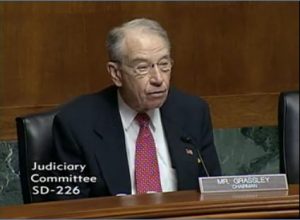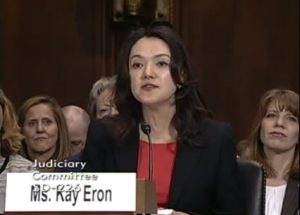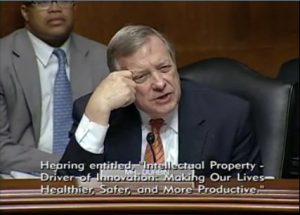On the morning of Tuesday, April 25th, the full Senate Judiciary Committee convened a hearing entitled Intellectual Property – Driver of Innovation: Making Our Lives Healthier, Safer, and more Productive. Taking place one day prior to World Intellectual Property Day, the day’s meeting focused on how intellectual property enables innovators to make meaningful impacts in the lives of consumers and the challenges of enforcing intellectual property rights. Echoes of the patent troll debate were also sounded to the likely consternation of U.S. patent owners across the globe.
“As a society, we depend on innovators… to make our lives better and to solve the challenges we face,” said Sen. Chuck Grassley (R-IA), chairman of the House judiciary committee. Grassley cited statistics published by the U.S. Chamber of Commerce’s Global Intellectual Property Center (GIPC) on the 40 million American employed by IP-intensive industries. These same industries contribute $5.8 trillion to the nation’s gross domestic product (GDP) and account for 74 percent of U.S. exports, according to the Global IP Center. In his opening statements, Sen. Chris Coons (D-DE) cited separate statistics from the U.S. Department of Commerce which reported $6.6 trillion in value added to national GDP from IP-intensive industries.
Despite these benefits, both Senators also spoke to problems currently facing the U.S. system of intellectual property. Coons cited the February 2017 Global IP Index published by the GIPC which reported that the U.S., despite placing first in trademark and copyright protection, was only 10th overall for its sytem of patent protections, tied with Hungary. The number of new businesses created during 2014 was at a 40-year low, another point cited by Coons as proof that the U.S. was losing its competitive edge in IP protections. Along with a weaker IP system, another concern as always is counterfeiting, which can create health and safety concerns as well as drain $4.2 trillion from the global economy by 2022. Grassley also spoke about his efforts to enable the transfer of acceleration certificates awarded under the Patents for Humanity program by reintroducing the Patents for Humanity Program Improvement Act, a bill co-sponsored by Sen. Patrick Leahy (D-VT).
The first panelist to offer remarks was Matthew Allen, acting assistant director for the Intellectual Property Rights (IPR) Center with U.S. Immigration and Customs Enforcement (ICE). “The illegal distribution and sale of counterfeits pose a threat to health and safety,” Allen said. “Counterfeiters only care about their product looking good enough to be purchased, they only care about their bottom line.” Allen spoke to two agency initiatives being pursued by the IPR Center. One of these is Operation Engine Newity which investigates claims of counterfeit goods in the automotive, aerospace, rail and heavy industry sectors, many of which pose significant safety concerns. Another is Operation Joint Venture, an effort towards more public-private partnerships to enforce intellectual property rights and educate consumers on the impacts of counterfeits.
Next to speak was Key Eron, general manager of health & life sciences at Intel Corporation (NASDAQ:INTC). Eron noted the more than $12 billion Intel invested in research and development during 2016 in support of Intel’s commitment to IP. “We see first-hand the amazing power of high-tech innovation to improve the healthcare of all Americans,” Eron said. She spoke about computational tools applied by Intel with health industry partners which reduce the time needed for genomic sequencing from a week to a matter of hours and improve real-time data analysis during clinical drug trials. Eron spoke of Intel’s commitment to strong IP rights even as she referenced 2014 statistics pushed by Mark Lemley and others on the 42 percent of patents declared invalid when validity was challenged in the federal court system. “Long gone are the technologies which work as standalone products,” Eron said. “If one part of the chain breaks down because of a weak patent, the entire system can be brought to a standstill.”
More reasonable views on the strength of IP rights were next proffered by Dr. Ashifi Gogo, CEO of Sproxil, a company offering an short message service (SMS) and data application platform for consumers designed to give them the capability to check whether an item is a counterfeit. Gogo noted that counterfeit products have been an issue going all the way back to the 2nd century BC with a documented case of one Gallic winemaker who attempted to copy the trade dress of a well-known Italian wine. Securing supply chains and educating consumers through tools like Sproxil could help to make IP theft unprofitable, Gogo testified.
The voice of the manufacturing sector was brought forth that day by Dr. Conor Madigan, co-founder and president of organic light emitting diode (OLED) component manufacturer Kateeva. “We’re proof that high-tech domestic manufacturing is not only possible but can be competitively advantageous,” Madigan said, further acknowledging that IP has been instrumental to driving innovation at Kateeva. “It’s only with a huge investment in time and money that we can build a product with this kind of global impact.”
Bioscience and related industries always have a large stake in patent discussions and the day’s hearing also included testimony from Dr. Neal Gutterson, VP of R&D at hybrid seed developer DuPont Pioneer. He noted that DuPont Pioneer invests $90 million each year on developing new corn seeds which exhibit improved yield and grain quality. “Fortunately, the United States allows patents on seed developments,” Gutterson said. He added that strong intellectual property rights were vital to initiatives like plant breeding and data-driven analytics for improved agricultural yield. “Sustainability will improve as a direct result of our investments in digital agriculture,” Gutterson said. One major challenge faced by the industry was the lack of a global standard leading to diverse national standards on data collection practices.
In questioning, Sen. Amy Klobuchar (D-MN) decided to advance the patent troll narrative and found a perfect sounding box in Eron to do so. “Patent trolls can use weak patents to extract monies,” Klobuchar said. Eron assented, noting that, while she was not an expert in IP laws, her understanding was that low-quality patents hurt Intel’s resources, diverting them from innovative R&D and towards litigation defense. “We do have a problem with patent trolls,” Sen. Thom Tillis (R-NC) would later add. “I don’t buy this idea that big guys are trying to squeeze out the small guys, a lot of times they’re looking for those smaller guys to scale up,” Tillis said, noting that app stores are filled with services being brought to the market on platforms provided by larger developers like Google and Apple.
Some sobering thoughts on the patent troll issue were offered by Sen. Dick Durbin (D-IL), who said that the phrase has changed the whole debate on patent protection. “Whoever came up with that phrase should get a special bonus,” Durbin said, “because they manage to mischaracterize anyone who goes to court to assert patent rights as a troll… What I came to understand was one man’s patent troll was another man’s assertion of a patent right which they fought for and worked for for years which is now being infringed upon by some giant.” He asked the panel to quantify the amount of actual trolling going on compared to the legitimate assertion of patent rights. After a long beat where no one spoke, Durbin asked the panel, “Won’t touch it, huh?” The one panelist who did finally answer the question was Madigan, who said it was “important to strike the right balance” in curbing abusive litigation without making it too difficult for smaller players to settle disputes with larger companies.
Another major issue discussed at the hearing was the growing challenge of combating counterfeits in the age of e-commerce. According to Allen, counterfeits are increasingly being sent into the United States from foreign culprits through express shipping or mail sent through a foreign post office. Counterfeit goods still enter the country through containers shipped overseas, but the avenues for counterfeits have increased in the digital age. “Counterfeiting is a trade that depends on profits,” Gogo would later say. He reiterated his stance that educating consumers about the negative impacts of counterfeits would go a long way in preventing counterfeiters from successfully selling their ripoffs. Given that a great many American consumers knowingly purchase counterfeit NHL jerseys, Gogo’s stance could be viewed as overly hopeful.
The day’s most interesting question came courtesy of Sen. John Kennedy (R-LA). “If each of you [on the panel] were king or queen for a day, how would you change IP laws in America?” he asked. Allen and Gogo both said that they would focus less on changing the laws as they currently were and more on educating the consumer base about counterfeits. “We believe that strong patents benefit scientific progress while weak ones hinder progress,” Eron said. She was also puzzled by the high percentage of patent cases filed at the Eastern District of Texas, stating that it was her understanding that 40 percent of patent cases are filed in that district court. “It doesn’t make sense from a business standpoint,” Eron said. “I find to be strange that many of the patent cases are filed in that court.” Madigan said that he would like to see efforts to standardize IP laws and institutions globally, noting that it was most likely that his company would face infringement issues coming from Asian markets. “Every innovation is critical to the future,” Gutterson said in his answer to Kennedy’s question. “Both IP and regulatory consistency are important to bring products to market in a timely fashion.”

![[IPWatchdog Logo]](https://ipwatchdog.com/wp-content/themes/IPWatchdog%20-%202023/assets/images/temp/logo-small@2x.png)




![[Advertisement]](https://ipwatchdog.com/wp-content/uploads/2024/05/Quartz-IP-May-9-2024-sidebar-700x500-1.jpg)
![[Advertisement]](https://ipwatchdog.com/wp-content/uploads/2024/04/Patent-Litigation-Masters-2024-sidebar-last-chance-700x500-1.jpg)

![[Advertisement]](https://ipwatchdog.com/wp-content/uploads/2021/12/WEBINAR-336-x-280-px.png)
![[Advertisement]](https://ipwatchdog.com/wp-content/uploads/2021/12/2021-Patent-Practice-on-Demand-recorded-Feb-2021-336-x-280.jpg)
![[Advertisement]](https://ipwatchdog.com/wp-content/uploads/2021/12/Ad-4-The-Invent-Patent-System™.png)






Join the Discussion
14 comments so far.
SV Inventor
May 2, 2017 11:33 am@6 Paul, what can we do (more specifically) to help swing that pendulum?
Night Writer
May 2, 2017 11:07 amhttp://money.cnn.com/2017/05/01/technology/trump-american-technology-council/index.html?iid=ob_homepage_tech_pool
What do you think this group of monopolists are going to tell Trump about patents?
(Notice too that Tesla is free with their IP as long as it is very hard to copy, i.e., you need a factory, but with the software and self-driving systems, well, those are a big secret.)
Night Writer
May 2, 2017 10:52 am@11 step back: the justices say that they take their reality from the briefs submitted to the court. Let’s face it, we are half a step from becoming a third world country.
step back
May 2, 2017 10:21 amNight re @8
What I found haunting (if you watched the whole video) was that language about fundamental building blocks being ‘free for all and exclusive to no man’ (something like that –paraphrasing).
Where have we heard that free for all line before?
Where have we before seen that ‘transforming’ language of the video?
Where?
Where?
Did Thomas J. come up with that language all by his originalist self in Alice?
Or was he merely copying and transforming?
Such mysteries.
So deep.
So unfathomable.
Night Writer
May 2, 2017 09:16 am@8 another thing to consider is how many years was it between discovery how to smelt metal and discovery how to make steel? Thousands of years.
So, sure get rid of the patent system and we can just have much slower progress.
You have to love the games these people on the videos play of trying to frame the issue of whether it would happen or not vs. the real issue of the rate.
Night Writer
May 2, 2017 08:55 am@8 thanks step back.
The flaw in their thinking is the rate at which progress continues. They are probably right that at some point (maybe 10,000 years from now) these things would be invented. But, what has changed with the patent system is rate of invention.
The people that write these either don’t know or don’t care about the simple reality of capital and people having time to work and motivation to work on things.
Another thing they always go back to Xerox and PARC, but guess what that is not a fair comparison because that was done back in the days of the giant monopolies (I guess we have come back to that) and they would have research parks as a public service and fight off the anti-trust talk.
I would bet that most of the people who talk about these things could not even answer simple questions about how patents are used at most tech companies. If you asked them for example to write an essay on patents at Cat or Analog Devices that they would have no idea.
step back
May 2, 2017 03:20 amFood for thought, a YouTube claiming that innovation is “inevitable” and therefore we shouldn’t have intellectual property. (Hint skip to minute 7:00 after getting the drift of this anti-IP video clip)
https://www.youtube.com/watch?v=NAKa0AJHhL4
step back
May 2, 2017 02:51 amI think Gene now allows for links to You Tube
Here is a link to part of the subject hearing
https://www.youtube.com/watch?v=2wbxQ9mm1RQ
Paul Morinville
May 2, 2017 02:13 amIPDude, I have spent the last two weeks in the Senate. It is definitely swinging. Now is the time to push. Now is the time to write, call, write and show up. Inventors are being asked what needs to be done. The discussion is turning on China. The dramatic shift of VC and startups to China is opening ears. The likely national security implications of buying critical infrastructure and military from China in a few short years if it continues makes offices not on the judiciary pay attention.
We CAN turn this back this year. WE need to get very loud right now.
IPdude
May 1, 2017 03:11 pmWhat’s promising is that we now have some democrats taking a stand against the infringer lobby. Google will always have their shills in Congress, but I’m happy to hear the pro-patent/inventor voices getting louder. The pendulum may be moving in our favor.
Night Writer
May 1, 2017 12:59 pmHow much did Google contribute to their campaign? Directly and through superPACs?
I think you can figure out their position based on how many Google bucks they took.
Ternary
May 1, 2017 10:28 amDurbin asked the panel, “Won’t touch it, huh?”
The senator seems to be one of the few who really thinks about the effects of current opinions and procedures on patent owners, and confronts lobby interests. Because indeed, almost nobody else will touch it.
angry dude
May 1, 2017 09:21 am“I don’t buy this idea that big guys are trying to squeeze out the small guys, a lot of times they’re looking for those smaller guys to scale up,” Tillis said, noting that app stores are filled with services being brought to the market on platforms provided by larger developers like Google and Apple.”
With DC politicians like that one America does not need enemies…
App stores graciously created by apples and googles so little hapless app developers can scale up and make money for themselves :):):)
we all should be grateful to apples and googles and their little paid stooges in wash dc
Valuationguy
May 1, 2017 08:43 amExcellent remark/question by Sen Durbin…..
The remark by Intel’s Eron about EDTX was irritating…but then I realized that she wasn’t a lawyer…and thus MIGHT be unaware of the BUSINESS ADVANTAGES of a patent owner filing there.